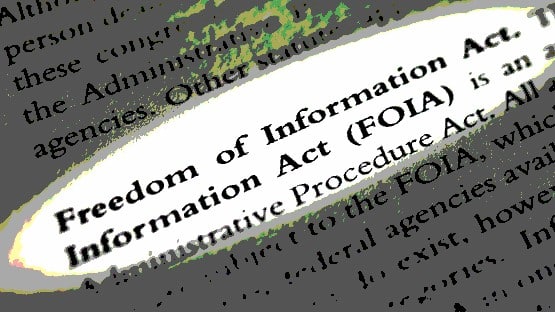
The court hearing on my push to get Augusta County to release the recording of a closed session of the Board of Supervisors that I am contending was held illegally was … surreal.
What I assumed would be a perfunctory exercise in pretense that average citizens can challenge the government in a government venue turned out to be anything but that.
Among the odd things from Tuesday’s hearing:
The county hired itself a high-powered attorney
The county is being represented by Rosalie Pemberton Fessier, an attorney with the Staunton-based law firm TimberlakeSmith.
They’re not messing around here.
Fessier, according to her bio, has argued cases in front of the U.S. Supreme Court.
I can’t imagine that a lawyer who argues cases in front of the Supreme Court comes cheap.
I’d love to know what the county is paying her and TimberLakeSmith.
I say I’d love to know, and one day we will know, but the county is, almost certainly, not going to release that information for a while.
I’m fighting a FOIA case here; the county is going to use FOIA to its advantage to hide behind legal exemptions to not have to tell us what the bill is until it absolutely has to.
I’ll predict here that we don’t get the number until next spring or summer at the earliest.
Whatever it is, it’s guaranteed to be more than I’ve spent to date on my case.
I was told going in by a contact at the Virginia Coalition for Open Government that FOIA challenge hearings are usually rather informal, so I decided to go it alone, representing myself.
There’s the old line about how a man who is his own lawyer has a fool for a client that seems to maybe apply here.
The FBI
I wasn’t prepared to do more than read an opening statement, but the judge told me I could call witnesses, and the county’s representation indicated that it planned to call witnesses.
Scott Seaton, who made the recording of the March 20, 2023, closed session that is at the center of my FOIA request, reached out to me by phone Tuesday morning to say that he wanted to be in the courtroom, as long as I didn’t want him not to be there, and that he’d be willing to testify if called.
So, I called him.
I don’t even watch “Law and Order” on TV, so, I know nothing about any of that kind of thing, but I did my best to try to establish through questioning that Seaton was a member of the Board of Supervisors, had recorded the meeting, and that he was of the opinion that it should be made public.
Fessier, on cross-ex, tried to extract several pounds of flesh from Seaton, repeatedly accusing him, in her questions, of having “surreptitiously” recorded the meeting, and other closed sessions of the board, and contending that he had violated state law in so doing.
The state code section that she referenced, 19.2-67, which is titled “Disclosure of information obtained by authorized means,” refers specifically to “investigative or law-enforcement officer(s),” and “police officer(s) of a county or city” – section 19.2 of the state code, on the whole, relates to “Criminal Procedure,” not meetings of public bodies.
We’ll see how that works out, right?
I actually raised an objection during this questioning, based on the relevancy of the questions to the matter at hand.
Now that I think about it, I was an avid viewer of “Better Call Saul,” so, I maybe kinda knew what I was doing as I got warmed up.
Where things got interesting was when Fessier asked Seaton about who he had given copies of the recording to.
Maybe she was trying to get him to either admit to having given copies to private citizens, as members of the Board of Supervisors have been contending for weeks, or get him on the record saying no, and then later, if the county could ever conjure up evidence that he, in fact, had, then, that would set up a perjury charge.
I believe this is called in the trade a “perjury trap.”
Seaton answered that he had turned over a copy of the recording for this meeting and other closed sessions that he had made to the county, per a BOS request, and also to the Department of Justice and FBI, which we wrote about last week.
Further pressed to identify who he had reached out to at the FBI, Seaton held back – saying he didn’t want to compromise the agent because it is an ongoing investigation.
The judge eventually had Seaton write the name of the agent on a slip of paper.
Thing is, I’d already seen the name. The county, in response to FOIA requests from other county residents in recent days, released copies of the letters that Seaton had written to the DOJ and FBI that included the agent’s name.
I mentioned this to the judge, without of course saying the name out loud, just to make sure that everybody knew, if the name is supposed to be protected, the county screwed up and made it public already.
Appeal?
I think I’m right on this, and I think I did a decent job making my case, but I hold no illusions that I’m going to win the case.
The deck is stacked against me, going up against the county, with its high-powered lawyer, reduced to having to ask a local judge to find on my behalf.
This is the reason government agencies hide behind FOIA laws. They assume nobody is watching in the first place, that few people will ever ask for information that should be public, that no one who is denied when they ask will ever take them to court, and that if things ever get that far, that they’ll be forced to turn over what they’re being asked for.
OK, I say that to say this: Fessier spent an inordinate amount of time at the end of the hearing trying to lock down what she’d be able to do if and when she would have to file an appeal.
I’m sitting a few feet to her right thinking, Um, seriously, this is in the bag, but she went on to raise concerns about not having enough time to appeal, and the recording being released to me before she could “perfect” her appeal.
The judge had, moments earlier, told us that he was going to issue his ruling on Sept. 28, three weeks down the road, and the county is worried about the appeal already.
They really don’t want that recording to get out.
That coda to the meeting right there strengthened my resolve to fight to the bitter end to get it.

 Share
Share






